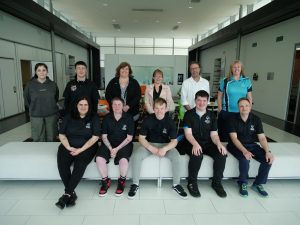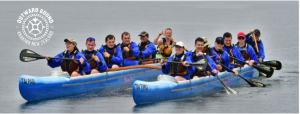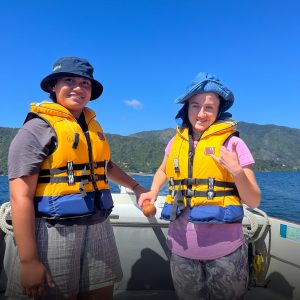Special Olympics New Zealand is unleashing leadership potential in athletes, providing opportunities to use their skills and abilities to respond to issues of importance to the community.
Athlete Leaders speak in their community and around New Zealand at seminars and conferences. They address functions and community groups about intellectual disability, Special Olympics and their experiences.
Athlete Leaders influence the community and policymakers on issues of concern to the intellectual disability community and have the confidence and skills to respond positively and proactively around issues important to the intellectual disability community.
Athletes who have gone through Athlete Leadership training are qualified to apply to be an Sargent Shriver International Global Messenger. Every four years, 10 athletes from around the world are selected to train and serve as International Global Messengers.
There are four key areas that contribute to Special Olympics New Zealand’s overall athlete leadership offerings.
Athlete Leadership Programme
The Athlete Leadership Programme (ALP) is an annual programme delivered by Special Olympics New Zealand designed to provide Special Olympic athletes with personal and professional leadership training and development they can apply to leadership roles in their Clubs, community, and workplace.
Based on the Special Olympics International ALP curriculum – the programme provides athletes with core knowledge about leadership behaviours, skills, how to strengthen their personal leadership attributes and identifies opportunities within Special Olympics and beyond.
Clubs are invited to nominate Special Olympic Athletes who are ready for this next step in their development for consideration for this programme each year, the athlete selection process is outlined below.
Nominations are now open for the 2025 Athlete Leadership Programme.
To nominate an athlete please return a completed and signed copy of the form below to Liz Fitzgerald at events@specialolympics.org.nz by 4.00pm Friday 30 August.
Download the Nomination Form Here
Printable Version
Selection criteria for the Special Olympics New Zealand Athlete Leadership Programme can be found here.

Core modules include but are not limited to:
Overview of Special Olympics:
Ensuring our athletes have a clear and in-depth understanding of Special Olympics in New Zealand (and to some degree internationally) and what makes it unique. Ensuring they are equipped with base knowledge to share their and our stories.
Defining Athlete Leadership:
- Guiding principles of leadership
- Leadership behaviours
- Key leadership skills
- Identifying and developing their personal leadership attributes
- Their own strengths and areas for growth
Roles and Opportunities:
- Identifying and developing roles in their communities and clubs
- Development of their personal leadership attributes and an on-going development / leadership plan
The Mentor Commitment
Athletes who undertake the ALP are wanting to give back and contribute to their clubs and fellow athletes, help to fundraise, and raise awareness of Special Olympics.
Just as our athletes need sports coaches to help them develop sport skills they also need coaches, mentors and facilitators to help develop their leadership skills.
The mentor role in the ALP is an immensely important part of the programme and the overall success of our athletes. Though we don’t want to make the mentor role too onerous – equally we want to ensure mentors understand the commitment and their important on-going role.
In addition to the athletes undertaking an online interview with SONZ management – as part of the application process athlete mentors will also be interviewed separately to ensure they fully understand the scale of the commitment involved with having their athlete join the ALP.
Part of the mentor commitment is to:
-
- Undertake and interview separately from the athlete during the application process
- Join the athlete at the first session in the programme in Wellington. SONZ will cover the cost of flights, ground transport in Wellington, catering and course costs.
- Complete the Special Olympics International online mentor training module prior to Session One of the ALP
The ongoing mentor's role is to:
-
- Act as presentation coach and make yourself available to support your athlete in all aspects of their training and role an Athlete Leader.
- Debrief with the athlete after each workshop and provide guidance completing any homework tasks.
- Help the athlete organise presentation opportunities in their local community and at events; and to assist the athlete prepare and practice their speeches; and to accompany the athlete to those presentations.
- Be prepared to act as a liaison point with SONZ and your local club committee.
- Be enthusiastic, encouraging and patient…and have fun!
Athlete Leadership Programme Schedule
|
2023-24 |
|
| 21 September 2023 | Introduction to Leadership |
| 4-5 December 2023 | Understanding Leadership |
| 2 April 2024 | Advanced Leadership Skill Development |
| 8 August 2024 | Personal Leadership Journey and Graduation |
| 2025 | |
| July/August 2024 | Call for Nominations |
| September/October 2024 | Athlete Interviews |
| November/December 2024 | Confirmation of Cohort |
| April, June, August & October 2025 | Athlete Leadership Programme Sessions *Mentors to attend April session |
| December 2025 | National Summer Games |
NB. There are no costs to the athlete or mentor to attend the ALP – with all attendance, travel and resource costs covered by SONZ.
Club Athlete Leadership Opportunities
The ALP is only one step in the leadership journey of our athletes, with future opportunities in their clubs and communities a critical part of their ongoing development.
There are many different examples of what leadership development looks like across the Special Olympic Clubs in Aotearoa New Zealand. The key is for our Clubs to work in partnership with athletes, SONZ and their communities to ensure athletes continue to strengthen their capabilities, can give back to their clubs in a meaningful way and enjoy the benefits of being a leader in their community.
Below are some examples of what Clubs are doing to continue the leadership journey of our athletes:
Coaching / Assistant Coaching
- Athletes undertaking coaching and/or assistant coaching roles
Event Coordination and Assistance
- Working with club leadership and volunteers to organise and deliver events
- Giving out medals, sports officials
Fundraising
- Working with club and volunteers to organise, lead and deliver fundraising initiatives and events
School Programme / Club Transition
- Assisting SONZ RSC’s in school programme delivery opportunities
Presentations / Speaking Opportunities
- Lions Foundation, Rotary Clubs, Potential Sponsors and Grant Funders
Athlete Mentoring
Purpose
Special Olympic Mentors support and guide Special Olympic Athletes in their personal development and growth, to fulfil their potential through:
- The Development of leadership skills
- Identifying and developing leadership opportunities in their Clubs and Communities
- Helping the athlete to voice their opinions, insights and thoughts – and be heard and listened to
- Preparing and practicing speeches
- Facilitating networking opportunities
- Following up with athletes, ensuring they are on track and ready for any activities they are involved with or undertaking
- Helping to ensure the athlete understands and is prepared for different environments and works with the athlete to maximise their success and enjoyment
- Attends events and activites with the athlete as a support and back up as needed
Responsibilities of an Athlete Mentor
Becoming a mentor requires a genuine desire to make a difference in the lives of our athletes and a commitment of time to the partnership both in terms of a weekly commitment and a minimum duration (at least 12 months and ideally 24 months) to ensure the mentor and athlete relationship has time to develop and strengthen.
All Special Olympic mentors must:
- Be registered with a Special Olympics Club
- Be 18 years and over and have undertaken the NZ Police vetting process
- Not be a family member
- Understand the SONZ Participant Protection Framework
We strongly recommend all Special Olympic Mentors:
- Complete the SOI Athlete Mentor Learning Module which takes approx. 45 minutes to complete and provides an excellent base of learning.
- Complete the Sport NZ online Child Protection in Play, Active Recreation and Sport e-learning module
- Watch this short video from Special Olympics International – Changing the World Special Olympics Mission
- Meet with their athlete regularly (weekly to fortnightly or more as required) to:
- Help the athlete reflect on their current situation, their goals and develop their future plans and aspirations
- Work on specific projects or roles
- Discuss the athlete ideas and concerns
- Share knowledge, experience, tools, resources and advice
- Keep the athlete on track and focused on their development
- Help the athlete voice their ideas and assist in putting their plans and ideas into action
- Make connections for the athlete to relevant people and networks
- Act as presentation coach and make themselves available to support their athlete through their development and training
- Help the athlete organise presentation opportunities in their local community and at events; and to assist the athlete prepare and practice their speeches; and to accompany the athlete to those presentations
- Be prepared to act as a liaison point with their Special Olympic Club, SONZ and/or their athletes local club committee depending on what they need and where they are at in their development
- Be enthusiastic, encouraging and patient…and have fun!
Outward Bound Horizons Course
Tuesday 27 August – Tuesday 3 September 2024
A unique opportunity for Special Olympics athlete personal growth and challenge, at the renown Outward Bound Anakiwa base.
An 8-day Outward Bound course for those with intellectual disabilities
Horizons is an adapted course, so whilst you’ll experience all the adventure of an Outward Bound course, there will be more rest breaks and more support available from three outward Bound instructors and two support workers. From sailing to high ropes, you’ll try all sorts of new activities, ensuring you return home with the motivation to try out new experiences and test your boundaries
Who is Horizons for?
Horizons can cater for a range of intellectual disabilities. Participants must be aged 18+, have left school and should enjoy being active.
All participants should be able to independently manage their personal care and medication.
You should be able to communicate clearly and understand safety instructions.
Horizons participants must be able to attend without a carer and have experience of spending time away from home.

Is funding available?
There is full funding available for eligible participants from MSD, including travel costs to and from the course. Some scholarship funding is available for those not eligible for MSG funding.
Fitness requirements:
You will need to be able to take part in a full day of activities, including up to a full day of walking, and be comfortable in and around the water.
The days can be quite busy at Outward Bound as there is a lot to fit in. You will start early each morning with some exercise and a dip in the water before heading off for the day’s activities. There will be rest breaks on this course, and life jackets are available at all times if you want one.

Support on course:
The course will be run by 3 of our expert Outward Bound Instructors who are there to make sure the environment is as safe and supportive as possible. Two support workers from Special Olympics will also provide support for you and your group.
For more information, contact Liz Fitzgerald: events@specialolympics.org.nz
Athlete Input Council
- Developed to provide athletes a platform to provide input, insights and advice to guide SONZ in their programme development, decision making and strategic direction
- One athlete is selected every two years by each Regional Council to represent their region’s athletes
- Clubs/regional councils will support the athlete in gathering ideas from other athletes in the region
- Additional athletes may attend Council meetings to share their learnings with the council eg. Health Ambassadors, SONZ Asia Pacific Representatives, Athlete Board / Committee Representative
- The chair of the AIC will sit on the SONZ board for the duration they are chair
International Opportunity
On occasion a number of opportunities do become available to our athlete leaders through Special Olympics Asia Pacific and Special Olympics International. These are generally on an ad hoc basis and will be communicated to clubs as detail is provided.
More information on the Athlete Input Council can be found here
Athlete Leadership Graduates
Resources:
Ideas for Being an Effective Committee or Regional Council Member
Ideas for Supporting Athletes in Leadership Roles
Keys to Working with Athletes as Committee Members
Keys to Working with Athletes as Regional Council Members
Building Inclusive Committees, Regional Councils and Boards
Athlete Representative on Club Committee
Athlete Representative on Regional Council
NZ Athletes in Governance